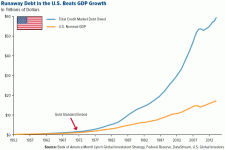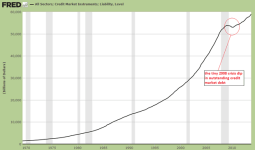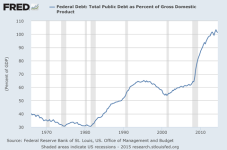Wow...you and Peter Schiff need to date. Excuse me but you are calling the stress test scenario a "powder puff" scenario?? The 10% unemployment scenario they are running is on the U3 measure of unemployment which currently stands at 5.3%. So the stress test is an unemployment scenario that is double where it currently stands on the U3 measure and which also happens to be where it peaked at the height of the recession in 2009. The U6 measure (which you are calling the real unemployment rate and you cited at 14% is currently 10.4%...14% was its rate a few years ago). So let me see, testing the banks capital ratios under a scenario where we double the unemployment rate from its current level and reaching where it maxed out at the height of the once in a generation financial crisis levels of 2008-2009 is a "powder puff" scenario. Plus assuming Dow 10,000, a 40% pullback from where we are right now and a 45% from our recent highs, is a joke of a stress test scenario...hmmm, not severe at all. And let me see what else do they assume in the severe adverse case: Corp bond spreads expanding from 170bps over treasuries to over 500bps, WTI prices at $110, GDP contracting by 4.5%, real estate prices contracting by 30% but yes these are all powder puff scenarios. The reason the financial institutions have passed these "powder puff" stress test scenarios is because in fact their capital provisions as measures by various capital ratios have improved. That's actually explained (by the way) by the fact that even though the Fed has printed/pumped a trillions of $ into the economy via QE1-3, what has happened to money velocity in the face of all this new supply?? Has it increased markedly? In fact, it has not which is why credit is still quite hard to come by (try getting a mortgage if you don't have 20%-30% down and a FICO score of 750+), which has actually depressed the US economy's ability to grow perversely. Dodd Frank has actually put a limiter on the rebound in our growth because banks have been generally cautious in extending credit.
As for HY spreads widening in the energy and materials sector, well...uhh...yes of course. We've only had oil go from $100+/bbl to $40/bbl in under a year. This is largely a supply-driven phenomenon, with OPEC playing chicken with the US shale players, as well as even more incremental supply likely to come on line from Iran with the nuclear deal opening up Iran to sell oil on the world markets. And with China's attempt at transitioning from an export-oriented and capital investment led economy to a consumer-driven economy, well yes, the boom in commodities like copper and steel which in fact peaked a couple of years ago. Whoopedy doo daa. So yes, small high-yield funded shale players in the energy space are going to go belly up (many of them) and the high-yield spreads have been widening in that space but while clearly a bad thing for those companies and the employees they employ, the number of busted high-yield energy deals will be insignificant in the scheme of overall credit markets. The difference between distress in the energy markets among smaller players (energy and materials sectors represent less than 10% of the S&P) and the distress we saw in the financial sector in the 2008-2009 crisis (which at the time represented close to 22% of the S&P) is that contagion impact from distress in the financial sector is widespread and impacts every aspect of an economy. Distress for small high-yield funded energy players has no contagion effect.
Anyway, I am not saying everything is peachy. I am certainly concerned about the amount of leverage that the US, Europe, and Japan have transferred from the private to the public sector. And yes, leverage puts a cap on long-term economic growth. But those were policy responses necessitated by a financial crisis that almost put us into financial oblivion. Trust me I was in the midst of it working at a large mutual fund company. I saw when The Reserve, one of the largest money market funds, broke the buck when Lehman collapsed. I covered the Industrials sector and my colleagues covering the Financials sector were shitting bricks. Markets were imploding. Commercial Paper dried up. Companies were not sure with the CP markets freezing whether they were going to be able to make payroll or pay their suppliers. I get how fragile things can be when market participants lose confidence in the markets and everybody is rushing for the exit door at the same time. You get the big sucking sound that was the 2008-2009 collapse. I just think we are not at the precipice as you seem to be suggesting.
Well you have said a lot here. Some of it I can agree with, but most of it, not so much.
You have accurately characterized the recession scenarios which are modeled in the Feds current Stress test. When you look at those parameters, it does look as if a fairly prudent effort is made to mitigate systemic risk. The problem is, IMO, you are looking at the wrong thing. The Fed has clearly picked conservative assumptions; where I believe it is highly deficient is in understanding what those scenarios will ultimately do to portfolios under these down turn scenarios given the unprecedented amount of excessive global leverage in the system.
In this regard, IMO the Fed has failed miserably and has little real understanding of what they are even trying to accomplish. In theses downside scenarios the Fed looks at historical loan performance by portfolio and runs multivariate regression against the macro economic variables you reference, in an attempt to be predictive.
Even in "normal" historical episodes this process has proved highly flawed. Historical regression is just not predictive for market-based, situation-specific traumas. The interrelation of so many variables has proven many times to undermine the statistical significance of these techniques.
Now enter the current condition. Regardless of which of the many measures of system leverage you choose to consider, the difficulty of using these techniques has now gotten far, far worse. It is impossible to regress against historical data when the single most important measure of system risk has skyrocketed instead of being held constant as would be the case in a soundly constructed regression.
The Fed can not begin to conceive of how to predict future portfolio performance because there is no historical data that remotely correlates what will occur with the current leverage condition. WE HAVE NEVER BEEN HERE BEFORE!
Pick any point from 5, 10, 15, 20 , 25 years ago and tell me how you can predict what portfolios will do with a 10% unemployment rate in the future by regressing the unemployment rates from down turns in these historical periods. The entire premise is laughable.
Regarding Dodd Frank, I take your point but IMO growth stagnation in the face of plummeting money velocity is due to excess leverage in the system not tight credit standards. As I said before, we just spent the next 30 years income. Its gone. Capacity was built to handle all this income (which was accelerated by borrowing) and now growth is not possible. The Central Banks are simply postponing the inevitable and the price for doing so will be currency collapse if we let the printing presses run to facilitate each countries grab for market share in a no growth world.
Dodd Frank is none-the-less a mess, effectively outlawing small banking institutions through excessive overhead; the polar opposite of reducing systemic risk.
Your comments regarding the current HY market are correct. It is a sector specific, supply problem which whipsawed a group of fairly small, leveraged companies chasing a gold rush. It is not IMO a canary in a coal mine regarding the macro issues under discussion. The markets show no sign of any of these problems. It may take years. Markets run way too far before they correct. But the farther they run the harder the correction.




